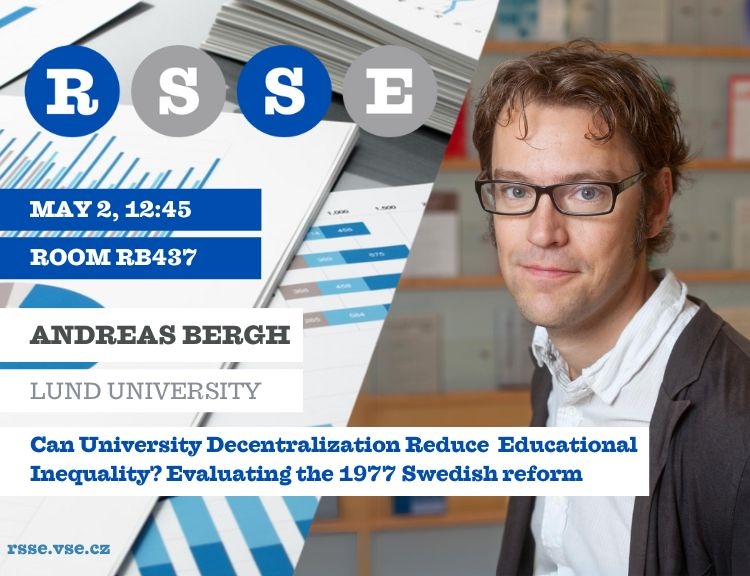Andreas Bergh (Lund University) 2.5.2024
It is our pleasure that professorAndreas Bergh (Lund University) will present on Thursday, May 2, 2024, at 12:45 in room RB437 about the topic “Can University Decentralization Reduce Educational Inequality? Evaluating the 1977 Swedish reform“.
Registration is not required and anyone who would like to attend is warmly invited.
It is also possible to participate online via MS Teams. To get access, please, contact lubomir.cingl@vse.cz.
ABSTRACT: In 1977, 12 new universities were created in Sweden, with the purpose of fighting socio-economic bias in higher education attainment, and to foster economic development outside the major cities. We evaluate the reform at the individual level and also at the municipal level. Ten years after the reform , the share of high school graduates completing a university degree had increased by almost five percentage points more in treated than control municipalities. The effect on intergenerational correlation in university studies is bimodal, with a treatment effect on obtaining a university degree 25% higher for youth whose parents both had graduated from university, and 5% among youth where none had graduate degrees, and null for youth where one parent had graduated from university. Since the group where no parent had a university degree is approximately 10 times larger than the group where both parents had university degrees, the reform had a net positive effect on university studies for the disadvantaged.
BIO: Andreas Bergh is Associate Professor in Economics at Lund University and fellow at the Research Institute of Industrial Economics in Stockholm. His research concerns the welfare state, institutions, development, globalization, trust and social norms. Among the questions that Andreas Bergh tries to answer with his research: What explains variation in welfare state size? How does the welfare state affect economic outcomes? What are the geographic aspects of inequality and polarization? How are people in developing countries affected by economic and social globalization? What explains the rise of populism in Europe? What explains corruption problems in Swedish municipalities? He has published in journals such as the European Economic Review, World Development, European Sociological Review, and Public Choice. He is the author of Sweden and the revival of the capitalist welfare state (Edward Elgar, 2014).
